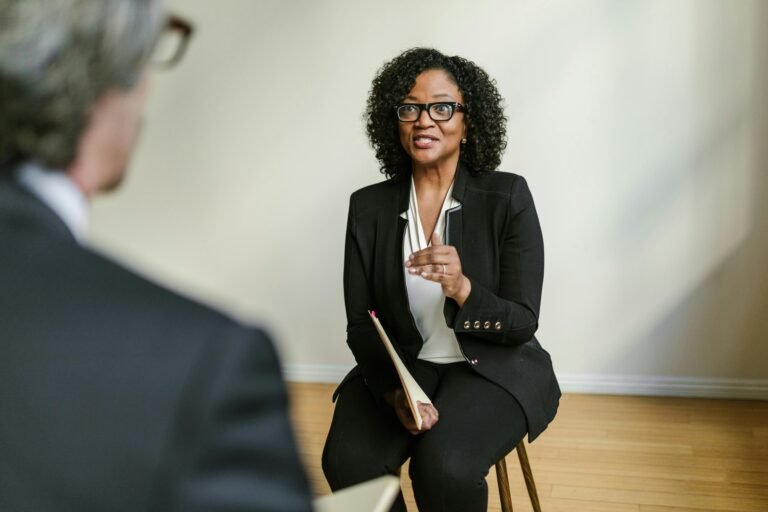Whether you’re applying to be a teacher, school leader, counselor, or support staff member, landing a role in a school isn’t just about ticking boxes on a resume. It’s about showing who you are, your character, your insight, and how well you align with the school’s mission.
And one of the most underrated ways to stand out in your interview? Self-reflection. The strongest candidates don’t just answer questions, they tell meaningful stories, connect their experiences to the role, and speak with clarity about who they are and why they do this work.
Let’s walk through how self-reflection can help you prepare purposefully, speak with confidence, and leave a lasting impression regardless of whether you’re new to education or stepping into leadership.
Why Self-Reflection Matters as you Prepare for your School Interviews
Hiring teams in K–12 education aren’t just looking for skillsets, they’re looking for people who are self-aware, reflective, and committed to growth.
In other words, they’re asking:
- Can you learn from your experiences?
- Are you open to feedback and change?
- Do you have a clear sense of purpose?
- Will you contribute to a culture of growth—for students and staff alike?
When you reflect on your journey, your strengths, mistakes, and what you’ve learned along the way, you show that you’re not just qualified, you’re thoughtful. In education, that kind of mindset isn’t extra credit. It’s essential.
Step 1: Know Your “Why”
Before you start preparing answers, take time to revisit your purpose. Why this role? Why this school? Why now?
It might seem like a simple question, but your “why” is often the thread that ties your responses together. Whether you’re talking about behavior management, instructional choices, or leadership style, your core motivation helps ground your answers.
Reflection prompts to try:
- What moments have reaffirmed your love for this work?
- What values guide your day-to-day decisions?
- What kind of school culture allows you to thrive—and why?
Sample for a Teacher:
“I became a teacher to help students feel seen and safe—especially those who might not always get that at home. One of the reasons I was drawn to your school is your focus on trauma-informed teaching. That kind of environment aligns deeply with how I approach my work.”
Step 2: Share Stories of Growth
One of the most powerful things you can bring into an interview is a moment where you grew.
Maybe you struggled with classroom routines your first year. Maybe a tough piece of feedback changed how you lead. These aren’t red flags—they’re reflections of a growth mindset, and they show that you’re constantly evolving in your practice.
Reflection prompts:
- What’s a mistake that helped you learn something important?
- What feedback did you receive, and how did you respond?
- How have you grown professionally over the last few years?
Sample for a School Leader:
“Early on, I thought strong leadership meant having all the answers. Over time, I’ve learned that asking the right questions—and creating space for others to lead—builds much stronger teams. That shift has helped our staff grow trust and take more ownership.”
Step 3: Tell Real Stories That Show Impact
Most interview questions are really asking: What did you do? Why did you do it that way? And what happened as a result?
Well-told stories help your interviewer understand how you think, how you work with others, and what you care about. Use self-reflection to prepare a few key examples that show your impact and values in action.
Reflection prompts:
- What’s a moment you’re proud of?
- When did your actions make a meaningful difference for students or staff?
- How did your values shape your decision-making?
Sample for Support Staff:
“Last year, I noticed that some students weren’t eating lunch—especially our ELL students. As a front office assistant, I don’t usually work directly in the cafeteria, but I brought the concern to our counselor. We created a buddy system and translated menus into three languages. It was a small change, but it made a big impact—and reminded me that support staff play a key role in student success.”
Tip: Ditch the Buzzwords
When you reflect deeply, your answers become naturally specific—and avoid falling into the trap of generic language.
Instead of saying, “I’m passionate about student success,” show it. What does that look like in action? What story proves it?
The more grounded your examples are in real experiences, the more authentic—and memorable—you’ll be.
Step 4: Connect Your Experience to the Role
As your interview approaches, take time to reflect on how your skills align with the specific needs of the job. This kind of intentional reflection helps you stay focused and answer questions with clarity.
Reflection prompts:
- What does success in this role look like?
- What strengths do I bring—and what am I still learning?
- How will I contribute to the team or school culture?
Sample for an Instructional Coach:
“What excites me most about this position is the chance to support both new and veteran teachers in making small shifts that lead to big gains. I’ve learned that coaching isn’t about ‘fixing’ people—it’s about listening well and co-creating pathways for growth.”
Putting it all Together: Reflection Helps You Stay Grounded
Job interviews can be stressful, especially in education where the stakes feel personal. But reflection doesn’t just help you prepare strong answers—it helps you stay calm and centered under pressure.
Before you walk into the room (or log into that Zoom call), ask yourself:
- What strengths am I bringing into this space?
- What do I hope to learn from this opportunity?
- What’s the one story or message I want the interviewer to remember about me?
Taking a few quiet moments to center yourself around your purpose can shift your energy—and help you speak from the heart instead of from a script.
In Closing: Lead With Reflection, Land With Confidence
Self-reflection isn’t just a preparation technique. It’s a professional superpower.
It helps you show up with clarity, humility, and confidence. It helps you tell real stories that connect—not just impress. And more than anything, it helps you show that you’re not just applying for a job—you’re here for the mission.
So before you cram facts about the school or practice canned responses, take a step back. Look inward. Reconnect with the moments that have shaped your journey in education.
And then walk into your interview ready to share not just what you’ve done—but who you are.
Because that’s what schools are truly looking for: real people who lead with heart.
Related Posts
Self-Reflection Worksheet for School Job Interviews
What to Say and What Not to Say About a Previous Employer
How to Conduct a Self-Assessment to Identify Your Strengths and Weaknesses
5 Strategies for Turning a Negative Job Experience into a Positive Interview Discussion
10 Body Language Tips to Improve Your Virtual School Interview Presence









